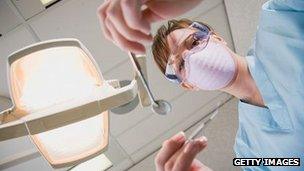Dentists urged to check patient drinking habits - Prof Jonathan Shepherd paper
- Published

Check-ups give dentists a unique opportunity to identify drink misuse, says Prof Shepherd
Dentists' questions about patients' drinking may help to identify health problems, says a Cardiff professor.
Excessive alcohol consumption can lead to cancer of the mouth, larynx and oesophagus and dentists may be the first to notice these conditions.
A university paper whose lead author is Prof Jonathan Shepherd said routine check-ups gave dentists a unique opportunity to identify problems.
It said binge drinking cost the UK economy about £25bn a year.
According to the paper in the Royal College of Surgeons' Dental Journal, an estimated one in five men and one in seven women in the UK are regular binge drinkers.
Prof Shepherd, professor of oral and maxillofacial surgery at Cardiff University, said excessive drinking could lead to cancer of the mouth, larynx and oesophagus and dentists might be the first to notice these conditions.
"The real issue here is not so much dental disease, important though that is, but the fact that the dental team and dentists have a duty of care, a wider duty of care, for maintaining overall health," he said.
"This is very much a part of the dentist being a part of the overall health care team.
"Of course, we go to the dentist for prevention purposes very often, for check-ups, and we're used to getting advice about diet and smoking from the dentist, so this is a very natural extension.
"Mouth cancer and pre-cancer are actually very rare conditions, but they clearly are very important, and when we go for a regular check-up to the dentist that's an opportunity for the dentist to look around the mouth carefully and spot these things at a very early stage, so that we can intervene quicker."
He said the dentist could also check for other problems, around the face in particular.
Prof Shepherd said promoting moderate drinking at the dentist could contribute to decreasing the economic, social and health burdens associated with alcohol abuse.
According to Cancer Research UK, alcohol is a major risk factor for oral cancer.
A study published in December 2011 estimated that, in 2010, about 37% of oral and pharyngeal cancers in men and 17% in women in the UK were linked to alcohol.
- Published23 March 2012
- Published16 February 2012